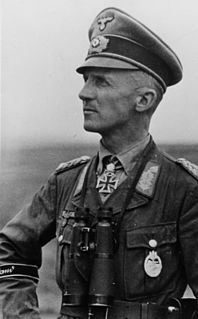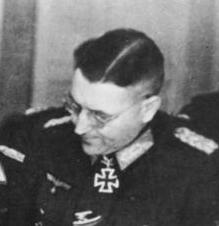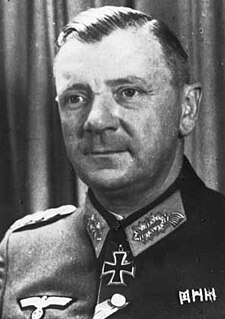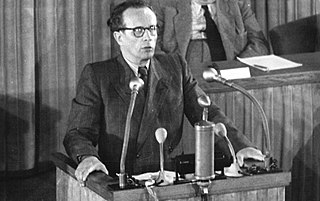
Freiherr Hasso Eccard von Manteuffel was a German baron born to the Prussian noble von Manteuffel family and was a general during World War II who commanded the 5th Panzer Army. He was a recipient of the Knight's Cross of the Iron Cross with Oak Leaves, Swords and Diamonds of Nazi Germany.

Ernst Hermann August Theodor Busse was a German officer during World War I and World War II.

Hans-Valentin Hube was a German general during World War II who commanded armoured forces in the invasions of Poland, France and the Soviet Union. In the course of the war, Hube led the 16th Infantry Division, XIV Panzer Corps, and the 1st Panzer Army rising to the rank of Generaloberst. He died in an air crash on 21 April 1944.

Hans-Jürgen von Arnim was a German general in the Nazi Wehrmacht during World War II who commanded several armies. He was a recipient of the Knight's Cross of the Iron Cross.

Johannes Friessner was a German general in the Wehrmacht during World War II. He was a recipient of the Knight's Cross of the Iron Cross with Oak Leaves.

Friedrich Karl Albert Dollmann was a German general during World War II who commanded the 7th Army during the Invasion of France and the early phases of the Allied invasion of Normandy until his death in June 1944.

Wilhelm Emanuel Burgdorf was a German general during World War II, who served as a commander and staff officer in the German Army. In October 1944, Burgdorf assumed the role of the chief of the Army Personnel Office and chief adjutant to Adolf Hitler. In this capacity, he played a role in the forced suicide of Field Marshal Erwin Rommel. Burgdorf committed suicide in the Führerbunker on 2 May 1945 at the conclusion of the Battle of Berlin.

The 28th Jäger Division was a German military unit during World War II.

Vincenz Müller was a military officer and general who served in the German army, the Army of Nazi Germany, and after the war in the National People's Army of the (East) German Democratic Republic, where he was also a politician. Müller eventually became a member of the East German parliament, the Volkskammer, and served as chief of staff of the National People's Army.

Karl Freiherr von Thüngen was a German general in the Wehrmacht during World War II who was executed in 1944 after the failed 20 July Plot.

Desiderius Hampel was a SS-Brigadeführer und Generalmajor der Waffen-SS during World War II who commanded the 13th Waffen Mountain Division of the SS Handschar and was possibly awarded the Knight's Cross of the Iron Cross (Ritterkreuz), the highest award in the military and paramilitary forces of Nazi Germany during World War II. After the war the Yugoslavian government asked for his extradition to charge him with war crimes, but he managed to escape from a British internment camp.

Hans Cramer was a German general in the Wehrmacht during World War II.

Edgar Feuchtinger was a German General (Generalleutnant) during the Second World War. Feuchtinger was commander of the 21st Panzer Division during the Normandy Invasion. Later in 1944 he was tried and convicted of treason by the Reich court, demoted and sentenced to execution. The sentence was commuted by the intervention of Adolf Hitler. Feuchtinger did not report to his next assignment, and avoided the German military police until he could surrender to the Allies.
Maximilian Fretter-Pico was a German general during World War II. He was a recipient of the Knight's Cross of the Iron Cross with Oak Leaves of Nazi Germany.

Job Odebrecht was a German general during World War II. He was also a recipient of the Knight's Cross of the Iron Cross of Nazi Germany.

Bodo Zimmermann was a German general during the Second World War. He also was one of the few recipients of both German crosses.

Kurt Haseloff (1894–1978) was a German general during World War II.

Rüdiger von Heyking was a German officer and Lieutenant General of the Luftwaffe during World War II.
Kurt Wilhelm Albert Karl Agricola was a general in the Wehrmacht of Nazi Germany during World War II who held senior level occupational rear-security commands in the occupied Soviet Union. A native of Saxony, Agricola entered army service in 1908 and served during World War I. During the interwar era, he held staff assignments and continued to rise through the army's ranks in the Wehrmacht of Nazi Germany. His career ended stalled in January 1939, when he was sent into retirement on political grounds because of his marriage to Martha born Hahn, a Jewish woman. Reactivated again upon the start of World War II, Agricola received exclusively positions behind the front line. As rear area commander of the 2nd Army in the occupied Soviet union during 1941–43, Agricola brought changes in the Wehrmacht's harsh occupation policies and was successful in maintaining control of his area of occupied territory from Soviet partisans. Shortly after the war's end, he was arrested by Soviet authorities, convicted of war crimes and remained in captivity for a decade. One of the last German prisoners in the Soviet Union, he was released in October 1955 and died shortly thereafter in West Germany.

The LXXXVIII Army Corps was an army corps of the German Wehrmacht during World War II. It was formed in 1942 and existed until 1945.

















